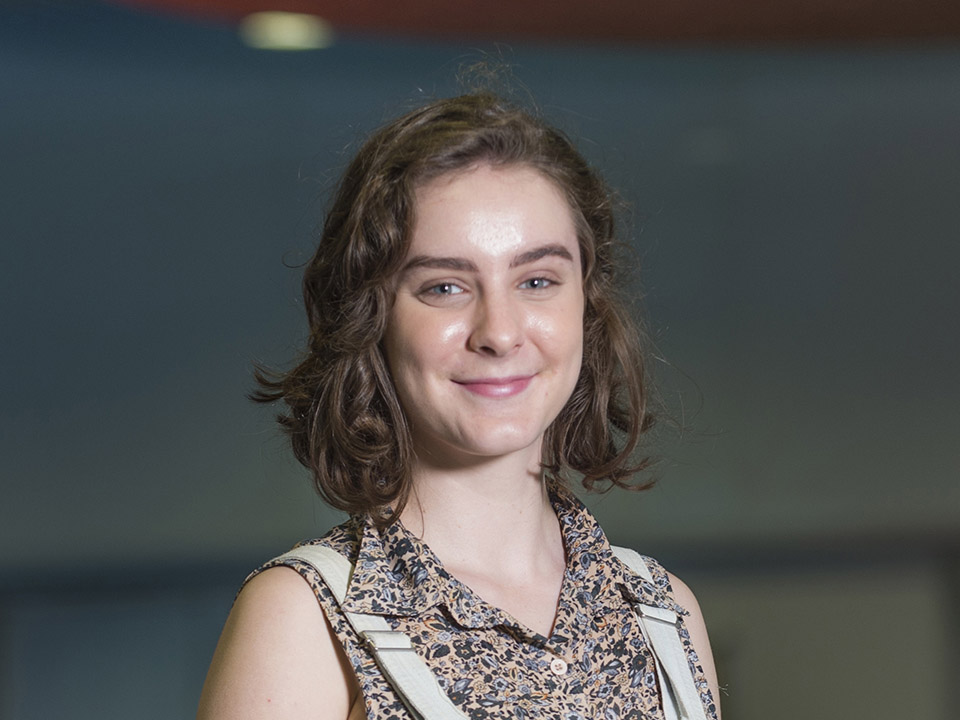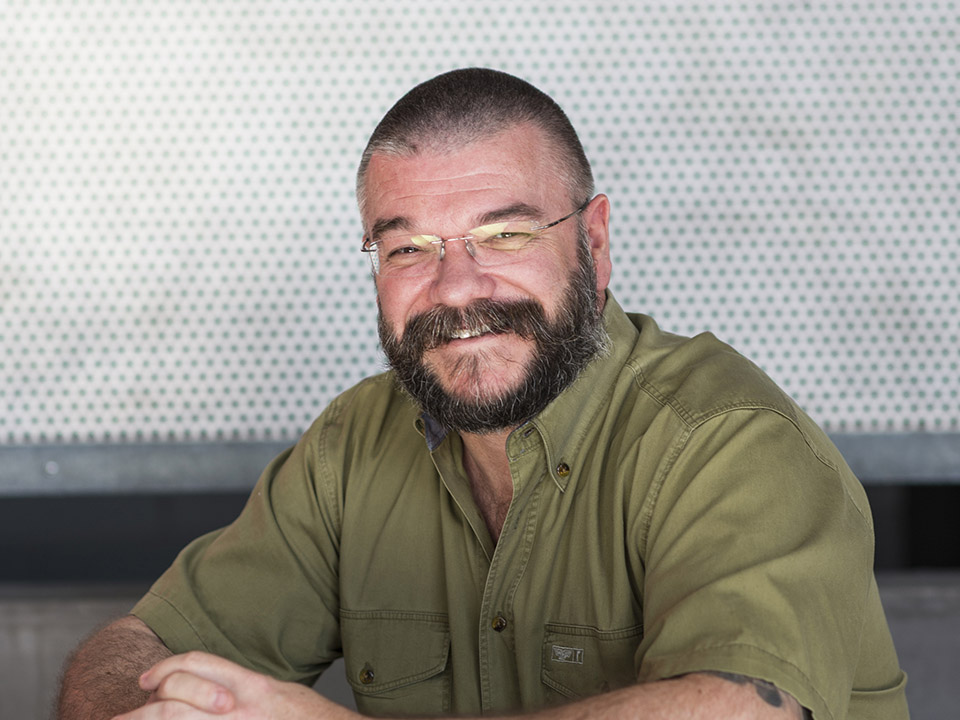What's it like studying biomedical science?
‘My favourite unit in biomed is definitely physiology: it covers so many different topics from neuroscience to clinical physiology, to pathophysiology – studying how and why we get disease. I think it’s one of the best units to broaden your understanding of the body. Every unit is different, we do hands-on learning in practicals, and learn important skills like professional communication and presenting.’
Explore biomedical science careers
Read our Bioscientist Jobkit to discover biotechnology careers, see a day in the life of a real graduate, and find out where biomedical science could take you. If you’re curious about science, interested in health or medicine, and love the challenge of solving problems, biomedical science could lead you to a dream career in a laboratory, in biotech industries, or even (with further study) as a doctor.
Hands-on learning
'One reason I chose QUT was the emphasis on flexible and practical, hands-on learning. QUT’s biomedical science course offers weekly practicals for all units. So we could be in the laboratory for up to 10-12 hours a week, which is not commonly offered in other biomedical science degrees. Practical classes provide us with invaluable laboratory experience, preparing us with the skills we’ll need in our field.'
Learn from the best
'Most of my lecturers are leading researchers, so we are given the most up-to-date research, and insights into projects being undertaken across the Brisbane region. The highlight of my studies so far is the opportunity to undertake a work integrated learning unit. I worked alongside a team of leading researchers. This experience gave me valuable industry connections and a chance to develop my skills within an industry setting.'
Experience science in 360 degrees
When you study with us, you’ll be working in real clinical settings and simulation environments from your first year. Explore our 360° environments and see what real-world health sciences can mean for you.
Hands-on learning
'One reason I chose QUT was the emphasis on flexible and practical, hands-on learning. QUT’s biomedical science course offers weekly practicals for all units. So we could be in the laboratory for up to 10-12 hours a week, which is not commonly offered in other biomedical science degrees. Practical classes provide us with invaluable laboratory experience, preparing us with the skills we’ll need in our field.'
What's it like studying biomedical science?
‘My favourite unit in biomed is definitely physiology: it covers so many different topics from neuroscience to clinical physiology, to pathophysiology – studying how and why we get disease. I think it’s one of the best units to broaden your understanding of the body. Every unit is different, we do hands-on learning in practicals, and learn important skills like professional communication and presenting.’
Learn from the best
'Most of my lecturers are leading researchers, so we are given the most up-to-date research, and insights into projects being undertaken across the Brisbane region. The highlight of my studies so far is the opportunity to undertake a work integrated learning unit. I worked alongside a team of leading researchers. This experience gave me valuable industry connections and a chance to develop my skills within an industry setting.'
Experience science in 360 degrees
When you study with us, you’ll be working in real clinical settings and simulation environments from your first year. Explore our 360° environments and see what real-world health sciences can mean for you.

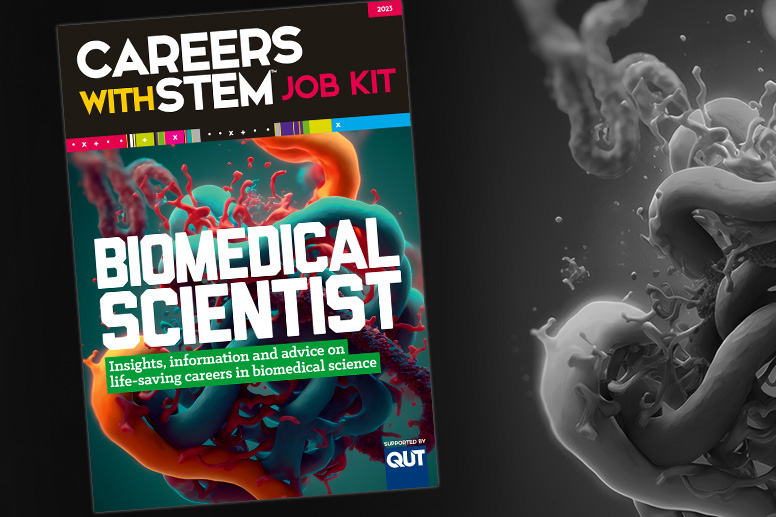
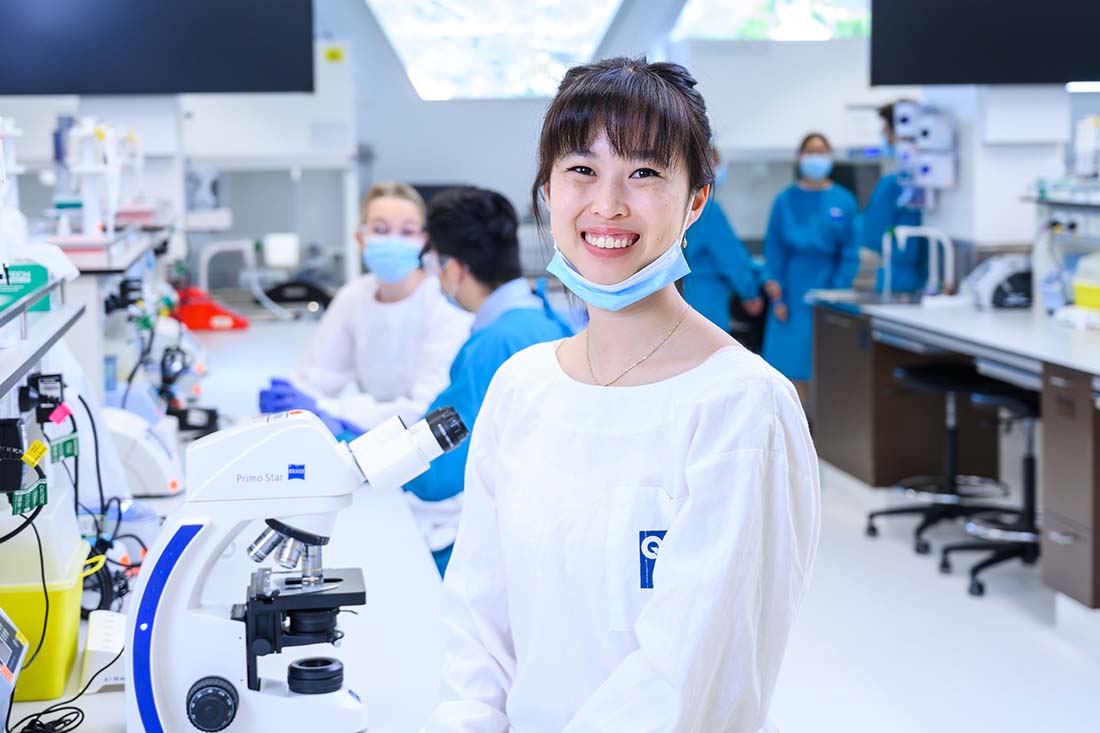
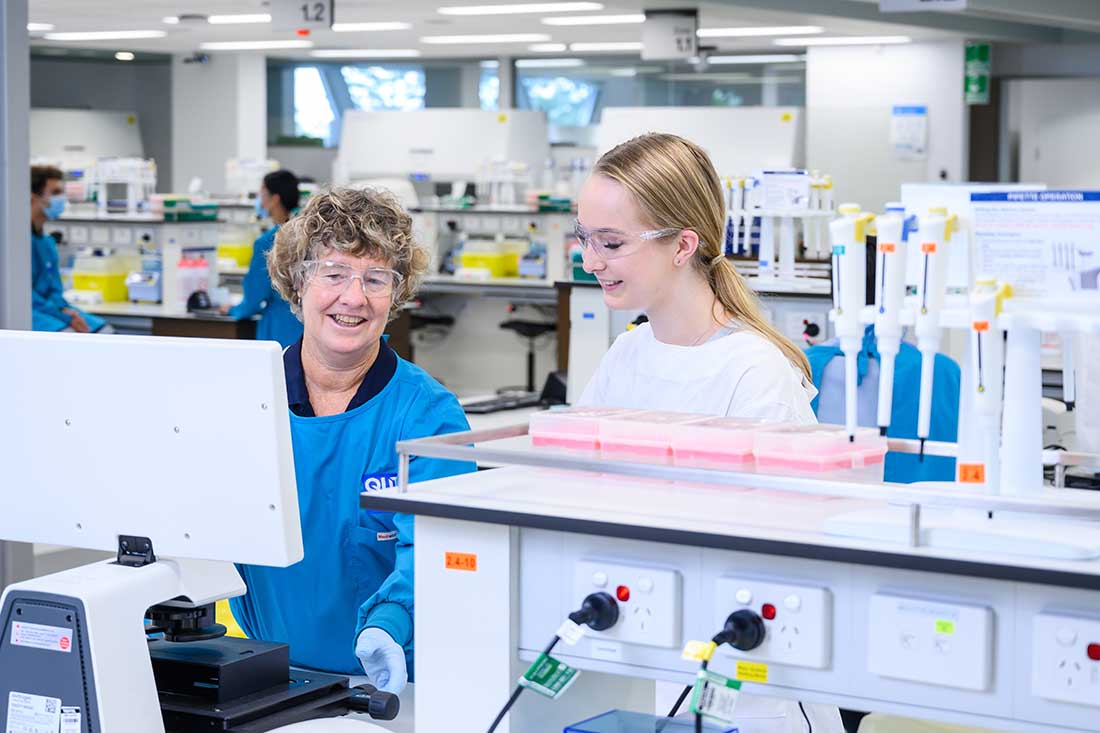
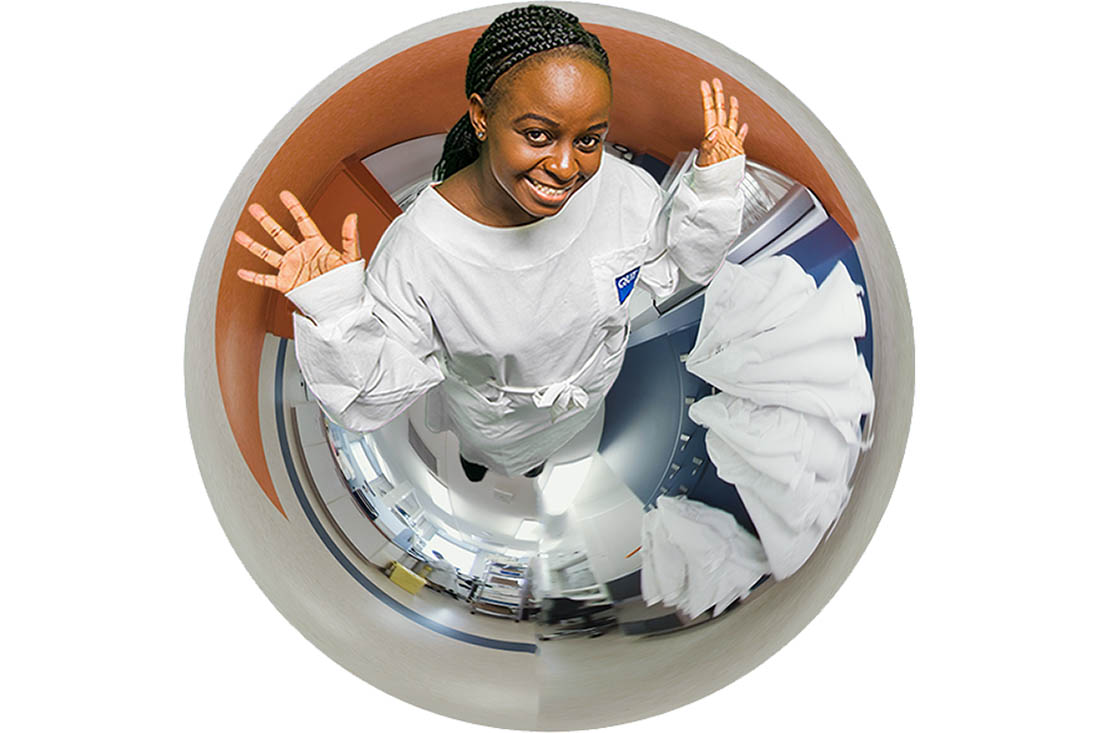




Highlights
- Choose one major and two minor study areas that align with your interests
- Develop industry-ready, hands-on skills from day one using cutting-edge technologies in laboratory classes from day one
- Gain experience that employers value through supervised work placements for credit towards your course in the biotechnology industry, in clinical fields, or in biomedical research
- Learn from award winning teachers, researchers, clinicians and industry leaders
- Build your capabilities by pairing this degree with one in business, law or mathematics or a vertical double with the Bachelor of Biomedical Science/Master of Data Analytics.
- Take opportunities to work with researchers, clinicians and industry leaders who have made ground-breaking discoveries.
Highlights
- Choose one major and two minor study areas that align with your interests
- Develop industry-ready, hands-on skills from day one using cutting-edge technologies in laboratory classes from day one
- Gain experience that employers value through supervised work placements for credit towards your course in the biotechnology industry, in clinical fields, or in biomedical research
- Learn from award winning teachers, researchers, clinicians and industry leaders
- Build your capabilities by pairing this degree with one in business, law or mathematics or a vertical double with the Bachelor of Biomedical Science/Master of Data Analytics.
- Take opportunities to work with researchers, clinicians and industry leaders who have made ground-breaking discoveries.
Why choose this course?
Biomedical scientists study how the body works, investigate how disease or injury interferes with normal function, and develop new treatments and diagnostic methods. Skilled in using a variety of cutting-edge technologies, biomedical scientists have been responsible for major health advances including the development of vaccines, antibiotics, and stem cell therapies.
Why choose this course?
You will have a high degree of course flexibility with the option to select a major and two minor areas of study that align with your interests, and prepare you for areas of emerging priority and employment.
The course has very large practical focus; you will be in the laboratory from week one and working on real biomedical and scientific problems throughout the course.
You may also complete studies in complementary areas from across the university including behavioural science, law, mathematics, engineering, business, nutrition and physical activity, criminology and policing, and journalism.
You will learn from leading researchers from the Translational Research Institute and partner research facilities at major Brisbane hospitals. QUT researchers have made groundbreaking discoveries in cancer biology, infectious diseases, tissue engineering and vaccine development.
Throughout the course, you will have the opportunity to develop industry-relevant practical skills and use cutting-edge technology in modern and well-equipped laboratories.
Learn from the best
You will learn from award winning teachers and from leading researchers from QUT Research Centres in the Faculty of Health, the Translational Research Institute and partner research facilities at major Brisbane hospitals. QUT researchers have made groundbreaking discoveries in cancer biology, infectious diseases, tissue engineering, the microbiome, genetics and vaccine development.
Explore this course
At QUT you will start learning hands-on in the laboratory from your first day, working on real-life biomedical problems. You will develop industry-relevant practical skills and use cutting-edge technology in modern, well-equipped laboratories. Gain skills valued by employers by undertaking work placements for credit towards your study with leaders in the field in biotechnology, biomedical science industries, research, clinical sciences or clinical physiology.
Our flexible course allows you to find your passion in first year, then choose from a range of exciting and rapidly evolving areas to meet your career and study goals. You will choose a major and two minor areas of study that align with your interests and prepare you for areas of emerging priority and employment.
You can build your capabilities and employment opportunities further with the vertical double, Bachelor of Biomedical Science/Master of Data Analytics, or take on a double degree with law, maths or business.
Customise your degree
Our flexible course design means you can shape your path to suit your interests and career aspirations. Choose your major area of study from the list below.
Anatomical sciences
Build a deep understanding of the human body and gain hands-on skills in dissection, histology, medical image interpretation and organ and tissue identification. Examine real examples from QUT’s unique collection which includes 3D images, an extensive skeletal collection, film library, pathology museum and human donor material.
Cell and molecular biotechnology
Study the cellular and molecular mechanisms that operate in normal and diseased tissues. Undertake laboratory Discover the cellular and molecular mechanisms underlying normal and disease processes, the human genome and how it is being used to accelerate advances in personalised medicine. Perform research in cancer biology, tissue engineering, human stem cells, genomics and proteomics.
Human biochemistry
Uncover the structure, function and properties of biomolecules and the molecular machinery that regulates our cells and tissues, metabolism, hormone action and disease. Learn protein science (proteomics) and apply cutting edge technologies to disease uncovering new diagnostic and treatment approaches.
Human physiology
Understand how the human body works at a deep level, from the molecule, to the cell, organ system and whole body. Physiology underpins knowledge of human health and disease, pharmacology (how drugs work) and medicine. Your diagnostic and research skills will enable you to work independently to design and perform your own laboratory-based research projects.
Infection and immunity
Learn how infectious disease agents (bacteria, viruses, yeasts, fungi and parasites) cause human disease, together with cutting-edge approaches to the diagnosis, treatment, control and prevention of infectious disease. Discover how our immune system combats disease and can be harnessed to treat diseases ranging from infectious disease to cancer.
Clinical physiology (minor)
Learn the clinical physiology and the techniques for testing patients and diagnosing patients with cardiac and respiratory illnesses, sleep disorders and neurophysiological disorders and discover new career avenues in this growing field.
Double degrees
Combine two bachelor degrees into a single course of study. A double degree allows you to specialise in two fields and pursue different interest areas, gaining a broader range of skills and knowledge, and giving you a competitive advantage and greater career flexibility.
Consider the following double degrees with a Bachelor of Biomedical Science:
- Business: develop your career in a drug regulation, compliance or policy development role in government, as an analyst for venture capital and investment banks, consultant to innovation commercialisation companies, or in the research sector.
- Law: work as a solicitor, barrister, in-house counsel, or lawyer to government health departments, the pharmaceutical industry or drug commercialisation companies.
- Mathematics: Graduate with the ability to collect, collate and analyse data; build and interpret mathematical models that reveal new insights into patient treatment regimens; and develop new models of care that optimise the quality and efficiency of health care.
You may also want to consider our Bachelor of Biomedical Science/Master of Data Analytics. You will graduate with two complementary skill sets that will enable an understanding of disease processes and modelling of diseases progression to ensure that you will be in demand and employable across Australia and internationally.
Careers and outcomes
Our graduates are employed locally, nationally and overseas and work for research institutes, universities, hospitals and biotechnology companies. There are increasing opportunities in consultancy, science journalism and companies involved in the development and marketing of new diagnostic and treatment products. This course also provides a solid grounding for you to pursue postgraduate study in medicine and other health disciplines.
Graduates who complete the clinical physiology minor as part of their studies may also work as a sleep scientist, neuroscientist, respiratory scientist or cardiac scientist.
This course also provides a solid grounding for students wishing to pursue postgraduate study in medicine and allied health. Postgraduate study provides graduates with the opportunity to pursue leadership and management roles in biomedical science, and the knowledge and skills to operate their own research lab and create new products.
Professional recognition
Depending on the units selected in final year, graduates will be eligible for membership into one or more of the following organisations: Australian Society for Medical Research, Australian and New Zealand Society for Cell and Developmental Biology, Australian Society for Biochemistry and Molecular Biology, Australasian Association for Clinical Biochemistry and Laboratory Medicine, Australian Society for Microbiology, Australian Neuroscience Society, The Endocrine Society of Australia, Society of Reproductive Biology, Australian and New Zealand Association of Clinical Anatomists, Australian and New Zealand Bone and Mineral Society, and Australian and New Zealand Forensic Science Society.
Possible careers
- Biochemist
- Biomedical laboratory officer
- Biomedical science researcher
- Biotechnology scientist
- Cardiac and vascular scientist
- Health researcher
- Laboratory assistant
- Laboratory technician
- Medical equipment sales
- Medicine (after further study)
- Neurophysiologist
- Reproductive technician
- Respiratory scientist
- Scientist
- Sleep scientist
Your Course
Year 1
You will undertake units covering chemistry, physics, anatomy, pathology and cell biology, providing a solid knowledge base for the topics covered later in the course. With QUT's practical approach to teaching, you will not only learn the theory, but gain a wealth of practical experience in state-of-the-art laboratories. You will also gain an introduction to the essential communication skills required for a career in the health and medical professions.
Year 2
You will have the option of choosing a major and two minors from five key biomedical scientific disciplines to align with your own career goals: anatomical sciences, cell and molecular biology, human biochemistry, human physiology and infectious diseases. You will have the opportunity to complement your studies by choosing a university wide set from a discipline outside of biomedical science, such as behavioural science, public health, human rights, entrepreneurship, mathematical sciences, international business or study a language. A minor is also available in Clinical Physiology which includes a 400 hour Clinical Physiology internship in which you will be placed in a hospital with professional clinical physiologists who will provide training in physiological instrumentation and measurement, recording, interpretation and reporting of clinical data. You will also have opportunities to gain real world experience as part of your course in Work Integrated Learning placements in biomedical research institutes and laboratories in the science industry.
Year 3
In the real world, the design and completion of successful research and/or business projects demand that individuals gather information, solve problems, work effectively as a part of a team and analyse and communicate results in a critical manner. Therefore each major in this course will culminate in a capstone unit which will require you to apply the knowledge and skills developed through your course. Capstone projects include human anatomical dissection, contemporary laboratory based research projects in biochemistry, physiology and cell and molecular biology, and diagnosis, characterisation and development of appropriate responses to an infectious disease outbreak scenario.
Course Design
The Bachelor of Biomedical Science comprises first-year studies in chemistry, physics, anatomy, pathology and cell biology, providing a solid knowledge base for the topics covered later in the course. Units in the second and third years combine advanced studies with theoretical, practical, and problem-solving skills. Several units in the area of humanities and applied health are an integral part of the course.
The Bachelor of Biomedical Science provides the necessary knowledge and skills to enter a career in biomedical research, with integration of research design and implementation, scientific writing and communication and practical laboratory skills embedded through each year of the course.
Furthermore students will be well prepared to sit GAMSAT which is designed to evaluate mastery and use of concepts in basic science as well as the acquisition of more general skills in problem solving, critical thinking and writing. The Bachelor of Biomedical Science provides a solid grounding in GAMSAT testing areas: reasoning in humanities and social sciences, written communication, reasoning in biological and physical sciences (including chemistry, biology and physics).
- ATAR/selection rank threshold
- 70.00
These thresholds are the lowest adjusted scores to which QUT made an offer in Semester 1, 2024.
Don't have a ATAR/selection rank?
- Course code
- LS40
- QTAC code
- 418401
- CRICOS code
- 052768K
-
- Gardens Point
-
- Gardens Point
- 3 years full-time
- 6 years part-time
- Part-time students should note that daytime attendance is required. Some lectures and tutorials may have evening sessions.
- 3 years full-time
- February
- February
Assumed knowledge
Before you start this course, we assume you have sound knowledge of the subject/s listed below. If you don't have the subject knowledge, you can still apply for the course but we strongly encourage you to undertake bridging studies to gain the knowledge:
- Biology (Units 3 & 4, C) or Chemistry (Units 3 & 4, C)
- English, or Literature, or English and Literature Extension, or English as an Additional Language (Units 3 & 4, C)
- Mathematical Methods, or Specialist Mathematics (Units 3 & 4, C)
Year 12 early offer scheme
If you're a current Queensland Year 12 student, you may be eligible to receive an offer for this course on the last day of Queensland Year 12, before receiving your ATAR or selection rank.
Offer guarantee
If you achieve an ATAR or selection rank of 77.00 or higher (including any adjustments) and satisfy all other admission requirements, you are guaranteed an offer for this course.
Advanced standing
If you have prior studies or work experience, you may be eligible for advanced standing (credit). You can apply for advanced standing once you've been accepted to QUT. If you're in your first semester of study, you must apply for advanced standing within 10 days of receiving your offer.
Deferment
You can defer your offer and postpone the start of your course for one year.
More about deferring your offer
Adjustments to your ATAR/selection rank
Any adjustments you receive to your ATAR or selection rank will be applied to this course.
Find out if you’re eligible for an adjustment to your ATAR or selection rank
Offers we made to school leavers in Semester 1, 2023
The figures listed in the tables below reflect the offers that were made to recent ATAR students. The entry thresholds box at the top of this page shows the lowest adjusted ATAR/selection rank required to receive an offer for all applicants for the most recent January QTAC offer round.
| Excluding adjustments | Including adjustments | |
|---|---|---|
| Highest ATAR/selection rank to receive an offer |
Selection rank
99.75
|
Selection rank
99.95
|
| Median ATAR/selection rank to receive an offer |
Selection rank
81.85
|
Selection rank
85.00
|
| Lowest ATAR/selection rank to receive an offer |
Selection rank
61.45
|
Selection rank
70.15
|
You can find out more about your fellow students’ backgrounds with this course’s student profile.
Other admission options
If you are of Aboriginal or Torres Strait Islander descent, you may be eligible for admission through our Centralised Assessment Selection Process (CASP).
I completed my studies outside of Australia
Select the country where you completed your studies to see a guide to the grades you need to apply for this course.
If your country or qualification is not listed, you can still apply for this course and we will assess your eligibility.
Assumed knowledge
- Biology (Units 3 & 4, C) or Chemistry (Units 3 & 4, C)
- Mathematical Methods, or Specialist Mathematics (Units 3 & 4, C)
You must have achieved this study at a level comparable to Australian Year 12 or in recognised post-secondary studies.
I completed secondary school in Australia
Assumed knowledge
Before you start this course we assume you have sound knowledge in these areas:
- Biology (Units 3 & 4, C) or Chemistry (Units 3 & 4, C)
- Mathematical Methods, or Specialist Mathematics (Units 3 & 4, C)
- ATAR/selection rank
- 70.00
Offer guarantee
If you completed secondary school in Australia and achieve an ATAR/selection rank of 77.00 or higher (including any adjustments) and satisfy all other admission requirements, you are guaranteed an offer for this course.
Minimum English language requirements
Select the country where you completed your studies to see a guide on meeting QUT’s English language requirements.
Your scores and prior qualifications in English-speaking countries are considered. Approved English-speaking countries are Australia, Canada, England, Ireland, New Zealand, Scotland, United States of America and Wales.
If your country or qualification is not listed, you can still apply for this course and we will assess your eligibility.
We accept English language proficiency scores from the following tests. Tests must be taken no more than 2 years prior to the QUT course commencement.
| English Test | Overall | Listening | Reading | Writing | Speaking |
|---|---|---|---|---|---|
| PTE Academic/PTE Academic Online | 58 | 50 | 50 | 50 | 50 |
|
Cambridge English Score
You must share your results with QUT through the Candidate Results Online website. |
176 | 169 | 169 | 169 | 169 |
| IELTS Academic / IELTS Online / IELTS One Skills Retake | 6.5 | 6 | 6 | 6 | 6 |
| TOEFL iBT / Home / Paper | 79 | 16 | 16 | 21 | 18 |
Don't have the English language score you need? We can help!
We offer English language programs to improve your English and help you gain entry to this course.
When you apply for this course, we will recommend which English course you should enrol in.
Course requirements
There are requirements that you will need to meet as a student in this course. You will need to identify these requirements and ensure you allow sufficient time to meet them. Some of these requirements have associated costs.
Blue card: You must undergo a criminal history check for working with children and be issued with a suitability card (blue card) before commencing clinical placement/practicum in an organisation where they may work with children or young people.
The processing of your application may take several months so you must submit your blue card application to HiQ as early as possible to ensure you have your card before you begin any unit that requires contact with children. There is no charge for student blue cards. Students who already have a blue card must register it with QUT.
Information is available from the Additional course requirements and costs website.
Course requirements
There are requirements that you will need to meet as a student in this course. You will need to identify these requirements and ensure you allow sufficient time to meet them. Some of these requirements have associated costs.
Blue card: You must undergo a criminal history check for working with children and be issued with a suitability card (blue card) before commencing clinical placement/practicum in an organisation where they may work with children or young people.
The processing of your application may take several months so you must submit your blue card application to HiQ as early as possible to ensure you have your card before you begin any unit that requires contact with children. There is no charge for student blue cards. Students who already have a blue card must register it with QUT.
Information is available from the Additional course requirements and costs website.
Your actual fees may vary depending on which units you choose. We review fees annually, and they may be subject to increases.
2025 fees
2025: CSP fees available from September
Additional Costs
There are requirements that you will need to meet as a student in this course. Some of these requirements have associated costs. Information is available from the Additional course requirements and costs website.
2025 fees
2025: Available from July
Additional Costs
There are requirements that you will need to meet as a student in this course. Some of these requirements have associated costs. Information is available from the Additional course requirements and costs website.
2024 fees
2024: CSP $9,000 per year full-time (96 credit points)
Additional Costs
There are requirements that you will need to meet as a student in this course. Some of these requirements have associated costs. Information is available from the Additional course requirements and costs website.
2024 fees
2024: $48,400 per year full-time (96 credit points)
Additional Costs
There are requirements that you will need to meet as a student in this course. Some of these requirements have associated costs. Information is available from the Additional course requirements and costs website.
Student services and amenities fees
You may need to pay student services and amenities (SA) fees as part of your course costs.
HECS-HELP: loans to help you pay for your course fees
You may not have to pay anything upfront if you're eligible for a HECS-HELP loan.
You can apply for scholarships to help you with study and living costs.
QUT Excellence Scholarship (Academic)
QUT's premier offering for students with outstanding academic achievement.
- Scholarship eligibility
- Academic performance
Keep up to date
QUT courses for you
Like to save your courses?
Please enter your first name and email so we can save your courses for you
